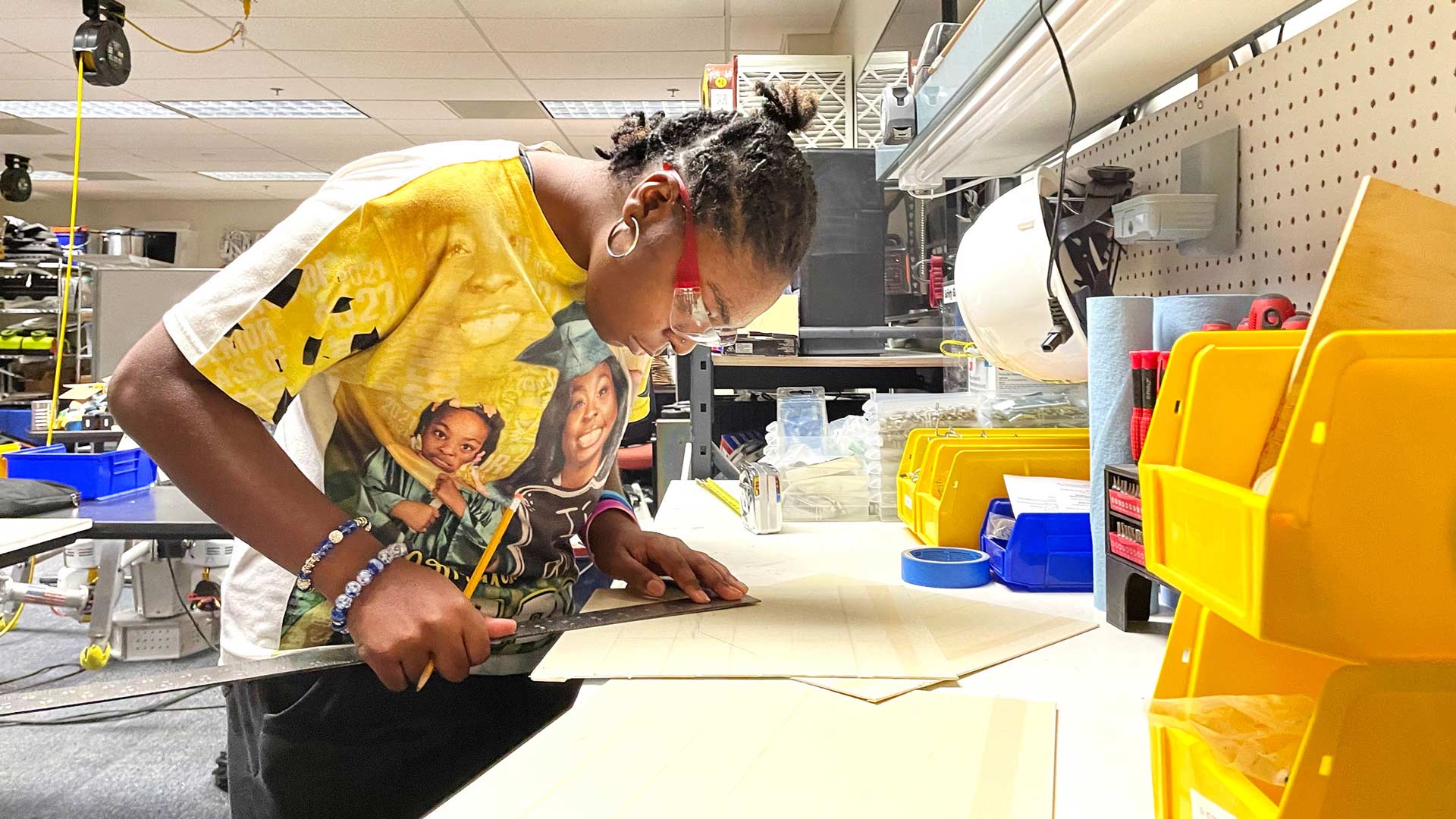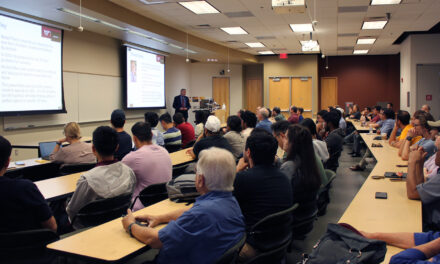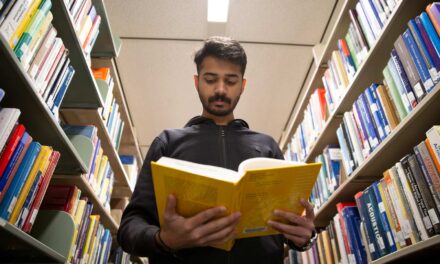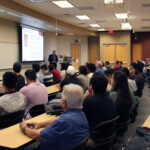
Discovering research and advanced degree possibilities with SURI
ASU’s SURI program gives students from around the world hands-on research experience

Students in undergraduate and master’s degree engineering programs are faced with a big decision for what to do after graduation: continue their education with a doctoral degree or start their careers in industry.
Arizona State University’s Ira A. Fulton Schools of Engineering developed the Summer Research Initiative, or SURI, program to help shed some light on what life is like for a doctoral student. During the program, sponsored by technology companies Intel and Texas Instruments, participants assist a faculty mentor with research, network with industry engineers, attend lectures from professionals in engineering and take part in social events with other SURI participants.
Started in 2019 by the Fulton Schools office of Outreach and Recruitment, SURI is coordinated by engineering Academic and Student Affairs Associate Director Kae Sawyer. The program is open to undergraduate and graduate students from around the world and primarily geared toward those considering doctoral degree studies, and students aren’t limited to research related to their majors.
“SURI differs from typical Research Experiences for Undergraduates sites funded by the National Science Foundation in that the research is not limited to a single project or topic,” says Patrick Phelan, a professor of mechanical and aerospace engineering and associate dean of graduate programs in the Fulton Schools. “Rather, any ASU engineering faculty member willing to engage with students can offer a research project.”
In 2023, SURI saw 41 students participate on campus, the most since the program started, and eight participate online.
Building a summer research path
Cabria Pirtle, a 2023 SURI participant and a rising junior studying biology at Lane College, a historically Black college in Tennessee, spent the summer in Tempe to take on a project to design a building to house a center of sustainability for her school’s campus.
“I wanted to have the opportunity to explore a different career path and make more informed career decisions,” Pirtle says. “I also wanted to gain a better understanding of my interests.”
She says her project taught her how to design innovative solutions to problems, analyze aesthetics and use design tools such as SketchUp and Adobe Illustrator to communicate visual plans.
Pirtle completed her SURI program under the guidance of Robb Olivieri, associate director of ASU’s Luminosity Lab, and Clara Hall, a program manager in the lab. The Luminosity Lab is an ASU-based research and development lab specializing in interdisciplinary work that also has a presence on Lane College’s campus.
“For me, being involved in SURI illuminates the importance of bringing students involved in any of Luminosity Lab’s programs to ASU,” Olivieri says. “It’s powerful to have that in-person experience with her and hopefully with others moving forward.”
Pirtle’s experience in SURI inspired her to pursue a master’s degree in chemical engineering.
“The exposure to such a complex and diverse program has been very beneficial to me,” she says.
Taming machine learning algorithms
Taman Truong is a rising senior at ASU triple majoring in computer systems engineering, electrical engineering and mathematics. In 2023, he participated in SURI for the second year.
After enjoying his SURI experience working on a machine learning project sponsored by Texas Instruments in 2022, Truong decided to take part again in 2023. He found the experience valuable for learning skills beyond what his classes taught, such as how to read research papers about complicated topics and the importance of asking questions to properly complete his work and understand its results.
His project this year focused on the effectiveness of using Gaussian mechanisms to add statistical noise to a data set to ensure differential privacy, or protecting sensitive information while retaining accuracy in algorithmic data analysis, in machine learning. Truong worked under Lalitha Sankar, a professor of electrical engineering in the Fulton Schools, and collaborated with Oliver Kosut, an associate professor of electrical engineering and colleague Sankar works closely with.
“Working with Dr. Sankar has been a rewarding experience,” Truong says. “I definitely felt like I was accomplishing something significant each week in the SURI program.”
Sankar also oversaw the work of online SURI student Rahul Rao, a rising sophomore majoring in computer science. Rao’s project sought to increase the accuracy of outputs from a type of generative artificial intelligence known as a generative adversarial model, which can produce outputs such as computer-generated images mimicking human faces.
Rao hadn’t conducted research before and, curious about the experience, applied for SURI. He found the program to be an opportunity to learn both hard skills in programming and math and soft skills such as how to communicate and work with others.
“SURI has been a positive experience overall,” Rao says. “I got to work on an interesting problem with an exceptional team.”
His work in the program now has him considering graduate school as a potential postgraduation path.
Guiding students to graduate studies
Seeing students pursue graduate degrees was Sankar’s goal when she started participating in SURI as a faculty mentor in 2020.
“I recognized there was potential to work with local students who liked mathematics, wanted to stay at ASU and were curious about opportunities to understand research,” she says. “I felt SURI could provide me with opportunities to identify such students with the potential to be a good fit for my research and perhaps bring them into the doctoral program.”
Sankar specializes in machine learning research, which requires collaborators with strong math, analytical and computing skills. Her work is largely theoretical, but she says that in today’s research environment, testing those theories is important.
SURI provides her with students to assist in testing theories, coding and running the algorithms theorized in her research. Some of the students’ contributions even have the potential to end up in her research papers with their work credited, including that of Rao and Truong.
“Exposing students to research opportunities and getting something in return, like the completed tasks the students work on, is a win-win for both parties,” Sankar says.
One of her SURI success stories is Nathan Stromberg, an electrical engineering doctoral student now studying under Sankar. He worked on a 2020 SURI project that quantified the benefits of a novel class of robust loss functions on a neural network’s training with noisy and even adversarially perturbed data and its performance after the system finished learning.
When he took part in SURI, Stromberg was an undergraduate student at the University of Kentucky majoring in math and computer science. Knowing he wanted to pursue a doctoral degree early in his undergraduate program, he found SURI while searching for chances to do research in the Phoenix area.
“SURI was a fantastic opportunity to join a research project and make actual contributions,” Stromberg says. “It also gave me a taste of what graduate school would look like. I got to focus entirely on one project for a summer and really understand it, and it gave me exposure to the research happening at large in my field.”
After his experience in SURI, Sankar continued collaborating with and supporting Stromberg throughout his senior year during his participation in an NSF Research Experiences for Undergraduates program.
Following his graduation from the University of Kentucky in 2021, Stromberg started his doctoral degree at ASU. As a doctoral student, he is developing post-processing algorithms that can limit retraining of large AI models when new datasets become available locally, a project on which he collaborates with top researchers from ASU, Google and Stanford.
“My time in SURI absolutely inspired me to pursue my PhD, and I am not sure I would have pursued it at all if I didn’t have such a good experience,” he says. “The quality of research happening in the labs at ASU and their contributions to tackling challenging problems from unique angles were inspiring for my own graduate work.”



































